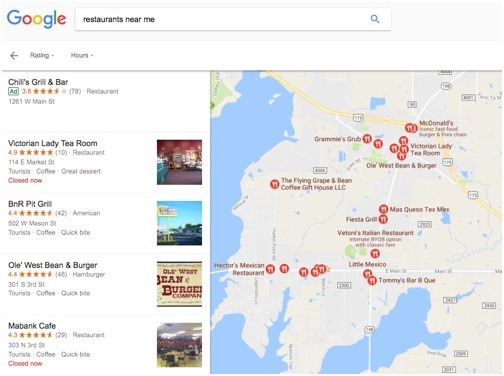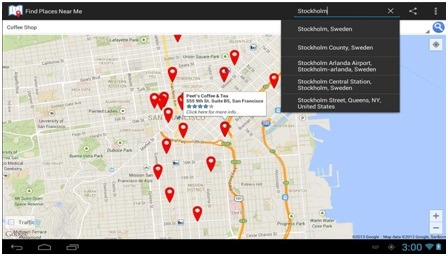Don't wanna be here? Send us removal request.
Text
How to Boost your Local Business with SEO
In today’s time, Search engine optimisation (SEO) is becoming more difficult and competitive, especially for small and local businesses. The practices for boosting a local business is also continuously changing to keep up with new features that search engines add to how they display search results for local search queries. If you have a local or small scale business with a website, then it is of paramount importance that you learn the right strategies through which you can boost it online to increase your sales. This guide provides you with the knowledge and tips that would help you boost your local business online.

For local businesses, there are generally three main types of local SEO strategy categories to concentrate on:
• Optimising local listings and citations.
• Optimising your website and its content.
• Optimising and working on the links to your website.
Among these three core categories, there are specific strategies that will help optimise your local presence, ultimately bringing more traffic and visibility to your website. Let’s have a look at each of these local SEO strategies in more detail.
Optimising Local Listings & Citations
Let’s begin with your NAP (Name, Address, and Phone Number) data. In order to get listed and ranked in the Google Maps, you have to be a legitimate business, and in some areas, you’ll need a business license (depending on the type of business niche you operate in). That NAP needs to be consistent and listed the same everywhere otherwise you will have problems later on.
Prior to getting started with local listings and citations, you’ll also need the following:
• NAP of the business.
• Website URL (list of internal location pages if there is more than one location).
• A short description (up to 50 characters) which should include your main county name and type of business.
• A longer description (up to 250 characters) that describes who are you and what exactly you do as a business. Include the city name and localities served if applicable.
• Recent photos of your business.
• Category of your business.
• Keywords that you’d like to rank for. These are typical “city name keyword” type keywords.
The main strategy for local listings and local citations is to get as many as possible in the right category, with consistent information such as your NAP data.

Local citations are the information of a local business, which includes NAP data. Local citations may or may not include a direct link to your website. There are usually two strategies for getting local citations:
• Get the local listings yourself
• Hire someone else to get them for you
Taking the time to get local citations yourself can be a really time-consuming and big project, especially if you’re in a competitive industry in your locality. Competitors could have up to hundreds of thousands of local citations, which is nearly impossible to do manually.
If you’re a local business in a fairly non-competitive market, then getting a handful of local citations manually is a good strategy. If that’s the case, a non-competitive local SEO strategy for local citations is to get these listings:
• Google My Business
• Facebook
• Yahoo! Local
• Apple Maps
• MapQuest
• Nokia
• Yelp
• TripAdvisor
• Foursquare
• Home Advisor
• Thumbtack
The last two on the list are specific to certain industries, and you’ll also want to search certain directories that are specific to your local business’ industry. Typically, these are easy to find and they’ll rank in the top 10 search results.
Submitting to directories and getting listed will allow your local business to take advantage of what’s often deemed as “barnacle SEO.” Your business gets listed on other websites that rank well for a certain keyword you’re targeting.
Once you have secured (and verified) those local listings, the next local SEO strategy is to get listed with the main data aggregators.
The data aggregators will take the information of the local business and make it available for literally thousands of websites to use. Make sure you’re using the correct NAP data and website URLs, as once the data aggregator gets hold of your data, it’s difficult and time consuming to get it corrected or updated.
Using a Third Party for Local Citations & Listings
Another SEO strategy is to outsource local citations and listings. Several third-party businesses allow you to submit your local business listing to them (short and long descriptions, the NAP data, URLs, etc.), and they will then use their connections to get that data on other websites as well. Many have agreements with certain data providers, and can efficiently get hundreds, thousands, and even hundreds of thousands of local citations.
These third-party services include:
· Bing places
· Brown Book
· Business Network
· City Local
· City Visitor
Some of these services are better than others, mainly because of the agreements they have with other websites and their technology. Some submit to only 30 websites, and others will end up getting a local business thousands upon thousands of local citations, many of which include a link to the website. Be wary of any third-party websites that set up a local listing on behalf of the local business but won’t give the local business the login and password for those listings.
Reviews Are Key
Getting reviews of your local business, especially on Google is going to help rankings and will encourage others to visit your business. People do read reviews online, especially for service-type businesses such as hotels, resorts, carpet cleaners, and even Taxi services. So if your local business is a service-type business or another business where reviews are important, then creating a good strategy for dealing with reviews is the key.

Local businesses need to request or encourage their customers to leave a review on their website. There are a lot of ways to encourage customers to leave a review. Some businesses post a plaque at the business asking for reviews. Other encourages reviews by offering a “gift” each month to a random reviewer.
The local business should respond to reviews just as quickly as they are left, regardless if it’s a positive or negative review. If it’s a positive review or comment, thank the customer for leaving a review. If it’s negative, deal with it quickly and offer to take the issue offline to minimise any future problems thereby ensuring that the negative review does not get out of hand.
However, one mistake that many local businesses make is they take the time to verify their local listings but won’t properly deal with reviews and respond to them in a timely manner. Local businesses should take their time to develop a strategy for encouraging reviews, conveying to their employees what that strategy entails, and designate a couple of people to respond to reviews. Here are some tips that you can employ to handle online reviews about your business:
• Designate one or two employees to handle the reviews.
• Encourage reviews by asking customers when they check out or pay for services.
• Send customers a letter in the mail, asking for a review after you provide services.
• Outsource the monitoring of online reviews and the response to those reviews. Typically, your SEO Company (or consultant) will help monitor and respond to reviews.
• Add a link on your website to a few other places where customers can leave a review.
• Add a form on your website so that users can anonymously leave a review or leave their contact info if they so wish.
• Create a comment box at your workplace, and provide them with a pen/pencil and forms. On the form, add a line for the customer’s email address. Ask them if you can post their review or testimonial online.
Reviews sent directly to the business can be posted on the company’s website (with the permission of the customer). Reviews left on a third-party website like on Google, Yelp, etc. cannot be copied and posted on the company’s website.
Reviews on third-party websites have in fact been given extra weight lately by Google. So sites like these, where customers can leave reviews and feedback, could potentially help with local rankings on Google:
• Yelp
• Trip Advisor
• Manta
• Facebook
• Foursquare
Another way to get more reviews is to create a postcard or handout that’s given to customers. Tell them you’d like their feedback, and use that feedback to make your business even better. They can leave you a review on your website, or on any of these third-party websites. Also, list the websites where you’d like them to leave a review.
Optimising Your Local Website’s Content
Without going into depth about optimising a local website, there are several on-site local SEO strategies that are important to consider:
• Optimise for “Near Me” search queries
• Be a local content machine
• Buy a local website or blog

Optimise for “Near Me” Search Queries
Lately, there has been a rise in the number of search queries that include the phrase “near me,” such as “restaurants near me” or “pharmacies near me.” These two search queries assume the search engine knows where the searcher is located.
Local SEO Guide recently published a list of “near me” local SEO ranking factors. These include:
• Google Reviews
• Backlinks with city in anchor text
• Percent of backlinks within city in anchor text
• Profile views
Things you can do to influence the rankings:
• Add “near me” or “nearby” in the title tag of pages on your website. If, for instance, you have a Store Locator on your website or a page that lists your locations, consider adding “Nearby” or “Near me” in the title tag of that page.
• Ensure that you have a unique web page for each business location. If you have more than one location, each location requires its own page on your site. If you have more than one location in one city, consider optimising each page for that part of town or the neighbourhood.
• Add “near me” or “near” and “nearby” in the copy of the pages whenever appropriate. For example, mention your location is “near the airport” or “the airport is nearby.” Consider using the names of other local event venues, city landmarks, or popular locations that people might search for.
• Consider using “near me,” “nearby,” and “near” in the internal anchor text of links to location pages on your website.
Work on getting more backlinks specifically to your individual location pages that include “city name + keyword” in the anchor text of the links.
Be a Local Content Machine
One interesting tactic for “local SEO strategy” that works well is becoming a local content machine. Essentially, by adding a blog page to your local business website and writing about local happenings and news, you are producing content that others in the city will want to read and share, especially on social networks.
While you’re not necessarily writing about your local business, you’re branding the business locally. When someone needs a company’s services, they’ll think of your business first since they’ve seen it so much online.
A local personal injury attorney hired a digital marketing agency with content writers to write articles every single day about accidents in their city. While they weren’t targeting the actual victims they wrote about, the social media shares went up dramatically and the attorney got his name out there in front of people in the city. Those social media shares ended up creating links to the website, which in turn boosted the attorney’s local rankings.
Buy a Local Website or Blog
If you’re looking to add a lot of content quickly to your local business website, consider purchasing a local website that already has the content that you need. It could be a local hobby website with local news articles, or it could be a local blog that has the content. Perhaps the owner doesn’t have the heart to keep up with the content like they used to or they could just use the money.
Approach a local website or blog about buying their site and incorporating or moving their content over to your local business website. Setting up redirects from the old domain name to your business website will help pass any link equity and history over to your local business.
Optimising and Working On Links

Google’s Possum algorithm update introduced in September 2016 has placed a greater emphasis on links. More specifically, local links or links from other local businesses and organisations are considered vital.
Experts say that a good rule of thumb is to find easy link opportunities by looking at the relationships you already have. Local sponsorships, local volunteer opportunities, and local offline groups are good sources to start, as they can all lead to local links.
Another SEO strategy for local links is to get links from competitors. Use a web crawler such as the Screaming Frog SEO Spider to crawl their website and review all of your competitors’ outgoing links. Then, see if there are any links you can get from websites your competitors are linking to. Essentially those competitors are passing link credit or PageRank to the other website that then passes it to your website.
Conclusion
If you are good at implementing some SEO strategies, you can either implement these tips yourself or you can seek help from a professional London SEO company, in either case, these SEO strategies will boost a company’s search engine rankings in both the map listings and the organic Search Engine Results Pages (SERPs), and will eventually help your business get more customers.
0 notes